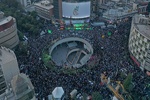Famous John Cotton Dana Professor of English and American Studies at Rutgers University, Professor Dr. H. Bruce Franklin, stresses in a Mehr News interview that strong human rights violations in American prisons actually stem from fundamental problems in American society.
Only days ago the 2014 Country Reports on Human Rights Practices was released by the United States. In this report Secretary of State John Kerry said that the US was not trying to be ‘sanctimonious’ about this report on human rights, he also added that when “human rights is the issue, every country, including the United States, has room to improve. And the path to global respect always begins at home”. In your opinion which areas do you believe the US should focus on, in order to improve, in terms of human rights?
Although our Declaration of Independence states that among every person’s “unalienable rights” are “Life, Liberty and the Pursuit of Happiness,” a tour of almost any US city — Baltimore, Philadelphia, San Juan, Miami, Los Angeles, Chicago, Washington, New Orleans, to name a few — reveals masses of people living in inescapable poverty and housing unfit for human habitation, deprived of adequate medical care and education, condemned to permanent joblessness, and terrorized by a hostile police force armed with a full panoply of military weapons. However, such conditions are hardly unique to the United States. But in one area, our nation has strong claims to be the worst violator of basic human rights: our criminal justice system. Almost a quarter of the world’s prisoners are in US prisons. Millions of American citizens have been deprived of the vote because of felony convictions inflicted by an unfair judicial system. This felony disenfranchisement was used to elect George W. Bush in 2000. In Florida alone, more than 400,000 citizens, mainly African-American were stripped of their vote, thus allowing Bush to win that state by 527 votes, thereby granting him the White House. The so-called “War on Drugs” is actually a War on the Poor, especially black and brown people.
While the US has had severe issues with racial inequalities, the American prison system has also been under strong critique. In your academic work you have called American prisons a “normalization of torture.” Can you tell me more about that?
To understand the depth of the both racial inequalities in the American prison system and how it has been used to normalize torture, it is necessary to recognize the roots of the prison system in African-American slavery. I have written about this extensively, especially in my books Prison Literature in America: the Victim as Criminal and Artist and Prison Writing in 20th-Century America. Of course torture was a necessary component of slavery, so there was an easy transition from the private plantations of the pre-Civil-War South to the vast prison plantations after that war.
What are some of the untold horrors of American prisons?
The typical American prison is designed and run to maximize degradation, brutalization, and punishment, overt torture is the norm. Beatings, electric shock, prolonged exposure to heat and even immersion in scalding water, shackled prisoners forced to lie in their own excrement for hours or even days, sodomy with riot batons, nightsticks, flashlights, and broom handles, months, years, even decades of solitary confinement in windowless cells, rape and murder by guards or prisoners instructed by guards—all are everyday occurrences in the American prison system.
Why is force feeding of hunger striking prisoners legalized?
In order to avoid the public embarrassment of prisoners when people realize that they were so brutalized that they starved themselves to death.
Is sexual harassment and humiliation used as torture element against prisoners?
Sexual humiliation is the norm, and rape is endemic. A 1999 Amnesty International report documented the commonplace rape of prisoners by guards in women’s prisons. Prisoners are forced to walk around naked in front of guards of either sex. They are routinely subjected to ‘cavity’ searches, that is, forcible searches of their anuses and vaginas. Some of the sexual tortures seen in those hideous pictures from Abu Ghraib come directly from prisons inside the United States.
Are there any similarities between regular American prisons and American-led prisons such as Abu Ghraib and Guantanamo Bay?
There are direct connections, not just similarities. One torture device commonly used in the American prison is the restraint chair, sometimes referred to, approvingly, as the “Devil’s Chair.” Prisoners are often kept in the chair for many hours, forced to sit in their own urine, feces, and vomit. In just four years between 1995 and 1999, eleven prisoners died from this device. In 1997, Lane McCotter, then the Director of the Utah Department of Corrections, was forced to resign because it was revealed that a mentally ill prisoner had died shortly after being strapped nude in a restraining chair for 16 hours. Immediately after the invasion of Iraq, Lane McCotter was put in charge of reconstructing Abu Ghraib. Another prison official driven out of office by revelations of abuse, this time by both the ACLU and Amnesty International, was John Armstrong, former Director of the Connecticut Department of Corrections. Like McCotter, Armstrong got a position administering imprisonment in Iraq. Then there’s Charles Graner, formerly a guard at the notorious Green County Prison in Pennsylvania, where guards routinely beat prisoners and sodomized them with nightsticks; Graner was sentenced to ten years in prison for abusing prisoners in Abu Ghraib.
Why does no one do anything against the conditions in these prisons?
Many individuals and organizations are in fact working to improve conditions in prisons, to reduce the prison population, or even to abolish the present system of incarceration. Two excellent sources of information about prisons and the struggle for prison reform are Prison Legal News and The Sentencing Project. A terrific activist organization is Critical Resistance.
Is there some financial benefit for the state? And what role does penal labor play?
Actually the huge cost of prisons is diverting funds from education and rebuilding America’s crumbling infrastructure. The virtually unpaid labor of prisoners is a powerful weapon in holding down the wages of American workers. Prison labor is against the interest of the working class. It creates some jobs, such as for prison guards and support work for the prisons, but takes many other jobs away from paid workers. The taxes to support prisons are enormous. Many US states now spend more tax dollars on prisons than on higher education.
In your opinion what are the most drastic steps that need to be taken in order to improve the state of American prisons?
Drug use should be decriminalized, and drug addiction should be treated as a personal and social disease. This alone would drastically reduce the number of prisoners. More fundamentally, all people should be given full opportunities for gainful and meaningful employment, first-class education, and necessary social support. Most common crimes are symptoms of a dysfunctional society. After all, the most dangerous criminals in US society are our war makers and exploiters of poor and working people.
Interview by Zeynep Aydin
Professor Dr. H. Bruce Franklin is the author or editor of nineteen books and over 300 articles on American culture and history. He has taught at Stanford, John Hopkins, Wesleyan, and Yale University. He is especially famous for his outspoken opposition to the Vietnam War and the American invasion of Iraq. Furthermore Prof. Dr. Franklin’s unique works on science fiction and American prison literature have been hailed for establishing and influencing entirely new fields of study. He has also aided in the making of four films. He currently works as a full professor at Rutgers University and has been awarded Rutgers’ first named chair, the John Cotton Dana Professor of English and American Studies. He is also the holder of the American Studies Association’s highest award for lifetime achievement.


























Your Comment